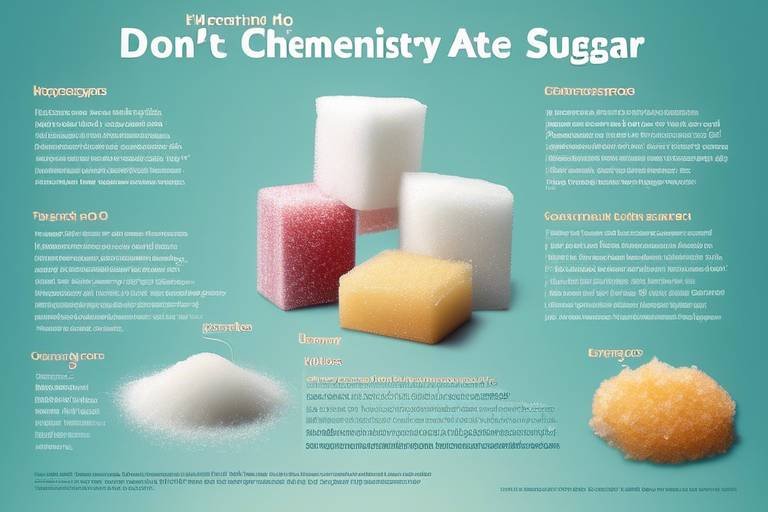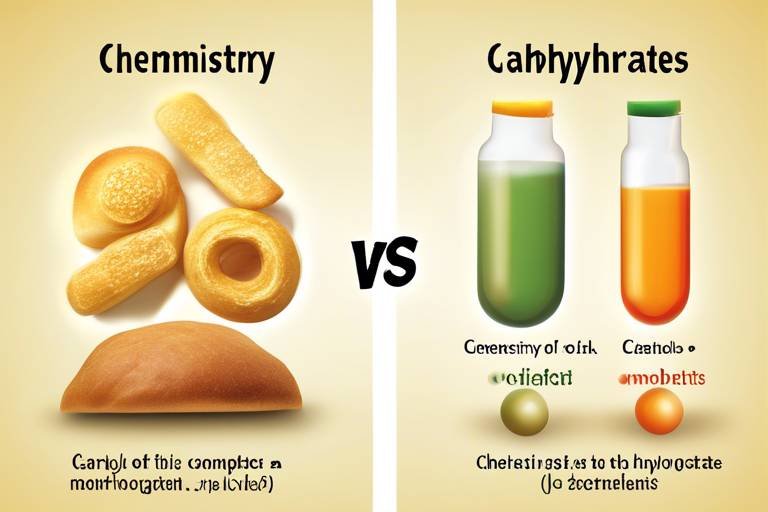The Role of Calcium in Bone Health - The Science Explained
Calcium is not just a mineral; it is a powerhouse of health that plays a crucial role in maintaining the integrity of our bones and teeth. When we think about calcium, we often picture a glass of milk or a slice of cheese, but its importance goes far beyond that. This essential nutrient is a key player in numerous biological functions, from muscle contractions to nerve signaling. Without adequate calcium, our bodies would struggle to perform these vital tasks, leading to a cascade of health issues that can significantly affect our quality of life.
Understanding the significance of calcium is critical for anyone looking to promote their overall health. Think of calcium as the building blocks of our skeletal system. Just like a sturdy house needs a solid foundation, our bones require calcium to remain strong and resilient. In fact, about 99% of the body's calcium is stored in our bones and teeth, making it essential for their strength and structure. The remaining calcium is found in our blood, muscles, and other tissues, where it supports various physiological processes. So, what happens when we don't get enough calcium? The consequences can be dire, leading to weakened bones, increased risk of fractures, and conditions like osteoporosis.
Bone density is a critical indicator of bone health, and calcium plays a vital role in maintaining it. Imagine your bones as a sponge; the denser the sponge, the more water it can hold. Similarly, a higher bone density means stronger bones that can withstand more stress. Adequate calcium intake is essential during childhood and adolescence when bone growth is at its peak. However, many adults overlook their calcium needs, which can lead to a gradual decline in bone density over time. This decline can set the stage for osteoporosis, a condition characterized by brittle bones that are prone to fractures, especially in older adults.
For calcium to be effective in promoting bone health, our bodies must absorb it efficiently. But how does this absorption work? Calcium absorption primarily occurs in the small intestine, where it is transported into the bloodstream. However, several factors can influence this process, including age, dietary composition, and the presence of other nutrients. For instance, consuming calcium-rich foods alongside vitamin D can significantly enhance absorption. Think of it as a team effort; just like a great band needs all its members to play in harmony, our body requires multiple nutrients to work together effectively.
Speaking of teamwork, let’s talk about vitamin D. This vitamin is not just a nice-to-have; it is essential for calcium absorption. Without sufficient vitamin D, the body struggles to absorb calcium, no matter how much you consume. It’s like trying to fill a bucket with holes; no matter how much water you pour in, it will never fill up. Vitamin D helps to close those holes, ensuring that calcium can be effectively utilized. Sources of vitamin D include sunlight, fatty fish, and fortified foods, making it crucial to include these in your diet for optimal bone health.
So, where can you find this magical mineral? Fortunately, there are plenty of delicious options available. Here are some of the best dietary sources of calcium:
- Dairy Products: Milk, cheese, and yogurt are classic sources.
- Leafy Greens: Kale, broccoli, and collard greens pack a calcium punch.
- Fortified Foods: Many cereals and plant-based milk alternatives are fortified with calcium.
- Fish: Canned sardines and salmon with bones are excellent choices.
Incorporating these foods into your daily meals can help you meet your calcium needs and support your bone health.
Now, let’s tackle the elephant in the room: calcium deficiency. When our bodies don't get enough calcium, the consequences can be severe. Initially, you may not notice any symptoms, but over time, the effects can manifest as weakened bones, muscle cramps, and even dental problems. The body will start to draw calcium from the bones to maintain necessary functions, leading to a decrease in bone density. This is a slippery slope that can result in osteoporosis and an increased risk of fractures, making it essential to prioritize calcium intake throughout life.
While it’s always best to get nutrients from food, some individuals may find it challenging to meet their calcium needs through diet alone. This is where calcium supplements come into play. They can be beneficial for those at risk of deficiency, but they come with pros and cons. On one hand, supplements can help fill the gap; on the other hand, taking too much can lead to complications such as kidney stones or cardiovascular issues. It’s essential to consult with a healthcare provider before starting any supplementation regime.
Understanding the recommended daily allowance (RDA) for calcium is crucial for maintaining bone health. The RDA varies depending on age and life stage:
| Age Group | RDA (mg) |
|---|---|
| Children (1-3 years) | 700 |
| Teens (9-18 years) | 1300 |
| Adults (19-50 years) | 1000 |
| Women (51+ years) | 1200 |
| Men (71+ years) | 1200 |
Meeting these guidelines can help ensure that your bones remain strong and healthy throughout life.
While calcium is essential, it’s also possible to have too much of a good thing. Excessive calcium intake can lead to health complications, including kidney stones, constipation, and impaired absorption of other essential minerals. It’s important to strike a balance and consume calcium within the recommended limits to avoid these potential risks.
- What are the symptoms of calcium deficiency? Symptoms can include muscle cramps, brittle nails, and frequent fractures.
- Can I get enough calcium from a vegan diet? Yes, there are plenty of plant-based sources of calcium, such as fortified plant milks, tofu, and leafy greens.
- How can I improve calcium absorption? Pair calcium-rich foods with vitamin D sources and avoid excessive caffeine and sodium intake.

The Importance of Calcium
Calcium is not just a mineral; it's a powerhouse when it comes to maintaining our health, especially for our bones and teeth. Think of calcium as the building blocks of our skeletal structure, providing the strength and integrity needed to support our bodies. Without adequate calcium, our bones can become weak and brittle, leading to conditions like osteoporosis. But that's not all—calcium also plays a role in various other bodily functions, such as muscle contraction, nerve transmission, and blood clotting. It's almost like the unsung hero of our biological processes!
Understanding the significance of calcium is essential for promoting overall health. The body requires a constant supply of calcium to function optimally. While we often associate calcium with dairy products, it can be found in a variety of foods. This means that even if you're lactose intolerant or following a vegan diet, you can still meet your calcium needs through other sources. Some of the best dietary sources include leafy greens, nuts, seeds, and fortified foods. The versatility of calcium-rich foods makes it easier for everyone to incorporate them into their diets.
Moreover, the importance of calcium extends beyond just bone health. It plays a vital role in maintaining cardiovascular health by helping to regulate heart rhythms and blood pressure. Calcium also supports the release of hormones and enzymes that are crucial for various bodily functions. When you think about it, calcium is like the oil in a well-functioning machine—it keeps everything running smoothly.
To emphasize its importance, let's look at some key functions of calcium in the body:
- Bone Health: Calcium is essential for developing and maintaining strong bones.
- Muscle Function: It helps muscles contract and relax properly.
- Nerve Transmission: Calcium is critical for transmitting signals between nerves.
- Blood Clotting: It plays a key role in the blood clotting process.
In conclusion, calcium is a vital mineral that supports not only our skeletal system but also various other bodily functions. Ensuring adequate calcium intake is crucial for maintaining overall health and preventing serious health issues. So, the next time you think about your diet, remember to include those calcium-rich foods for stronger bones and a healthier body!

Calcium and Bone Density
When we talk about bone health, calcium is often the first mineral that comes to mind. But why is that? Well, calcium is not just a mineral; it's the building block of our bones. Think of your bones as a house, and calcium is the bricks that hold it all together. Without enough calcium, your bones can become weak and fragile, leading to conditions like osteoporosis. But what exactly is bone density, and how does calcium play a role in it?
Bone density refers to the amount of mineral matter per square centimeter of bone. Higher bone density means stronger bones, which can better withstand the stresses of daily life. Calcium is vital for maintaining this density because it helps to form and maintain the structure of your bones. When you consume adequate amounts of calcium, your body can effectively build new bone tissue and replace old or damaged bone. This process is crucial, especially as we age, since bone density naturally tends to decrease over time.
Research shows that individuals who consume sufficient calcium throughout their lives often have better bone density compared to those who do not. In fact, studies indicate that a diet rich in calcium can help prevent bone loss in older adults, significantly reducing the risk of fractures and other complications. If you think about it, maintaining a high level of calcium intake is like investing in a strong foundation for your house; it pays off in the long run.
Furthermore, the relationship between calcium and bone density is not just about quantity; it's also about timing. The teenage years are a critical period for building bone density, as this is when most of our bone mass is developed. During this time, a diet rich in calcium can lead to greater peak bone mass, which is essential for long-term bone health. According to the National Institutes of Health, adolescents aged 9 to 18 should aim for about 1,300 mg of calcium daily to support this crucial growth phase.
However, it’s important to understand that calcium alone isn’t enough. The body requires a variety of nutrients to optimize bone health. For instance, vitamin D plays a significant role in calcium absorption. Without adequate vitamin D, even the most calcium-rich diet may not be effective. Therefore, it’s essential to consider a holistic approach to bone health, incorporating a balanced diet and lifestyle choices.
In summary, calcium is a powerhouse when it comes to maintaining bone density. Its role in building and maintaining strong bones cannot be overstated. As you think about your own dietary habits, ask yourself: Are you getting enough calcium? If not, it might be time to make some changes. Remember, a small adjustment today can lead to a lifetime of benefits for your bones.

Calcium Absorption Mechanisms
Understanding how our bodies absorb calcium is like piecing together a complex puzzle; each piece plays a vital role in ensuring that we get the calcium we need for strong bones and overall health. When we consume calcium-rich foods or supplements, our digestive system kicks into gear. The small intestine is where the magic happens. Here, calcium is absorbed through specialized cells lining the intestinal wall. But wait, it’s not that simple! The efficiency of this absorption process can be influenced by several factors, including the form of calcium consumed, the presence of other nutrients, and even our age.
To dive a little deeper, let’s consider the different forms of calcium available in food and supplements. Calcium carbonate, for instance, is one of the most common forms found in supplements. It requires stomach acid for absorption, so taking it with food can enhance its bioavailability. On the other hand, calcium citrate is more easily absorbed and can be taken on an empty stomach, making it a preferred choice for those with lower stomach acid levels.
Moreover, the presence of certain nutrients can either boost or hinder calcium absorption. For example, vitamin D plays a crucial role in this process. It helps the intestines absorb calcium more effectively, acting almost like a key that unlocks the door to calcium absorption. Conversely, substances like oxalates and phytates, found in foods such as spinach and whole grains, can bind to calcium and reduce its absorption. This means that even if you're eating calcium-rich foods, your body might not be getting all the benefits if these inhibitors are present. So, it’s essential to consider not just what you eat, but how it interacts with the calcium you consume.
Age also plays a significant role in calcium absorption. As we grow older, our bodies may become less efficient at absorbing calcium, which is why older adults often need to be more mindful of their calcium intake. Additionally, hormonal changes, particularly in women during menopause, can also affect calcium absorption and bone health.
To summarize, the mechanisms of calcium absorption involve a combination of dietary choices, nutrient interactions, and individual physiological factors. This intricate dance ensures that our bodies receive the calcium necessary for maintaining bone density and overall health. Understanding these mechanisms not only empowers us to make better dietary choices but also highlights the importance of a balanced intake of various nutrients to support optimal calcium absorption.

Role of Vitamin D
Vitamin D plays a crucial role in the body, particularly when it comes to the absorption of calcium. Think of vitamin D as the key that unlocks the door to calcium absorption in your intestines. Without this essential vitamin, your body struggles to take in the calcium it needs, no matter how much you consume. This is why vitamin D is often referred to as a synergistic partner in the quest for optimal bone health.
When you think about it, it’s fascinating how a single nutrient can have such a profound impact on another. Vitamin D enhances the efficiency of calcium absorption by promoting the synthesis of calcium-binding proteins in the intestinal wall. This means that when vitamin D levels are adequate, your body can absorb calcium much more effectively, leading to stronger bones and a reduced risk of conditions like osteoporosis.
But how do we get this vital vitamin? The most natural source is sunlight. When your skin is exposed to UV rays, it produces vitamin D. However, many people live in areas with limited sunlight or spend most of their time indoors. As a result, dietary sources become essential. Foods rich in vitamin D include:
- Fatty fish (like salmon and mackerel)
- Fortified dairy products
- Egg yolks
- Fortified cereals
In addition to dietary sources, some individuals may require supplements to maintain adequate vitamin D levels, especially those at higher risk for deficiency, such as the elderly or those with certain health conditions. It's important to consult with a healthcare professional before starting any supplementation, as excessive vitamin D can lead to toxicity.
In summary, vitamin D is not just a supplemental afterthought; it’s a vital player in the game of bone health. Ensuring you have enough vitamin D can make a significant difference in how well your body absorbs calcium, ultimately leading to stronger bones and a healthier you.

Dietary Sources of Calcium
When it comes to ensuring your bones are strong and healthy, play a pivotal role. Imagine calcium as the building blocks of your bones—without enough of it, those blocks can become weak and brittle. So, what foods should you be reaching for to meet your calcium needs? Let’s dive into some of the best sources!
First off, dairy products are often the first thing that comes to mind. Milk, cheese, and yogurt are not just delicious; they are also packed with calcium. For instance, one cup of milk contains about 300 mg of calcium. If you're not a fan of dairy or are lactose intolerant, don't worry! There are plenty of non-dairy sources that can help you reach your daily goals.
Leafy greens are a fantastic alternative. Kale, collard greens, and broccoli are rich in calcium, and they also come with a host of other nutrients. For example, just one cup of cooked collard greens can provide around 350 mg of calcium. Not too shabby, right?
Furthermore, fortified foods are another great way to boost your calcium intake. Many plant-based milk alternatives, such as almond, soy, or oat milk, are fortified with calcium, often containing similar amounts to cow's milk. Check the labels to ensure you’re getting the most bang for your buck!
For those who enjoy snacking, consider munching on nuts and seeds. Almonds are particularly high in calcium, offering about 75 mg per ounce. And let’s not forget about tofu, which can be a powerhouse of calcium if made with calcium sulfate. Depending on the brand, a serving can provide up to 400 mg of calcium!
Here’s a quick reference table summarizing some excellent dietary sources of calcium:
| Food Item | Calcium Content (mg) |
|---|---|
| Milk (1 cup) | 300 |
| Yogurt (1 cup) | 400 |
| Cheddar Cheese (1 oz) | 200 |
| Collard Greens (1 cup, cooked) | 350 |
| Almonds (1 oz) | 75 |
| Fortified Soy Milk (1 cup) | 300 |
| Tofu (1/2 cup) | 400 |
Incorporating these foods into your daily meals can be both easy and delicious. Think smoothies with fortified almond milk, salads topped with kale, or a snack of yogurt with almonds. It’s all about finding what works best for you and ensuring you get enough calcium to support your bone health!
Remember, though, that while dietary sources are ideal, some people may still struggle to meet their calcium needs through food alone. In such cases, discussing supplementation with a healthcare provider can be beneficial.
- How much calcium do I need daily? The recommended daily allowance varies by age and gender, but generally, adults need about 1,000 mg per day.
- Can I get enough calcium from a vegan diet? Absolutely! Many plant-based foods are rich in calcium, and fortified products can help fill any gaps.
- What are the signs of calcium deficiency? Symptoms can include muscle cramps, brittle nails, and in severe cases, osteoporosis.
- Is too much calcium harmful? Yes, excessive calcium can lead to kidney stones and other health issues, so balance is key.

Calcium Deficiency and Its Effects
Calcium deficiency is not just a minor inconvenience; it can lead to serious health issues that ripple through our entire body. When our bodies lack adequate calcium, they start to pull it from our bones, which can lead to a decrease in bone density. Imagine your bones as a sturdy house. If you remove bricks from the foundation, what happens? The structure becomes weak and unstable. Similarly, a calcium-deficient diet can lead to conditions like osteoporosis, where bones become porous and fragile, increasing the risk of fractures.
But the effects of calcium deficiency don't stop at bone health. In fact, this essential mineral is involved in numerous bodily functions. It plays a pivotal role in blood clotting, muscle contraction, and nerve transmission. Without sufficient calcium, you might experience muscle cramps, tingling sensations, or even irregular heartbeats. These symptoms are your body’s way of signaling that something is off balance. It’s like your internal alarm system going off, warning you that you need to take action.
Moreover, calcium deficiency can lead to other health complications, including:
- Dental Problems: Low calcium levels can weaken teeth and lead to decay.
- Hormonal Imbalances: Calcium plays a role in hormone secretion, and a deficiency can disrupt this balance.
- Increased Risk of Chronic Diseases: Studies suggest that low calcium intake may be linked to conditions such as hypertension and certain cancers.
It's important to recognize the signs of calcium deficiency early on. Symptoms can range from mild to severe, and they may include:
- Fatigue
- Bone pain or tenderness
- Muscle spasms
- Numbness or tingling in the fingers
To help visualize the seriousness of calcium deficiency, let's take a look at the following table that outlines the potential effects based on severity:
| Severity Level | Effects |
|---|---|
| Mild Deficiency | Fatigue, muscle cramps, and dental issues. |
| Moderate Deficiency | Bone pain, increased risk of fractures, and hormonal imbalances. |
| Severe Deficiency | Osteoporosis, numbness or tingling, and potential heart irregularities. |
In conclusion, calcium deficiency can have a profound impact on your overall health, affecting not only your bones but also your muscles, teeth, and even your heart. It's essential to monitor your calcium intake and ensure that you're getting enough through your diet or supplements if necessary. Remember, a strong foundation is key to a healthy life, and calcium is one of the main building blocks!
1. What are the symptoms of calcium deficiency?
Common symptoms include fatigue, muscle cramps, bone pain, and numbness or tingling in the fingers.
2. How can I increase my calcium intake?
Incorporate calcium-rich foods such as dairy products, leafy greens, and fortified foods into your diet. Supplements are also an option but consult a healthcare provider first.
3. Can I get enough calcium from a vegan diet?
Yes! There are plenty of plant-based sources of calcium, including almonds, tofu, chia seeds, and fortified plant milks.
4. Is it possible to have too much calcium?
Yes, excessive calcium intake can lead to health issues like kidney stones and cardiovascular problems. It's crucial to find a balance.

Calcium Supplements: Pros and Cons
When it comes to ensuring adequate calcium intake, many people find themselves pondering the role of calcium supplements. Are they a quick fix or a necessary addition to your diet? Well, let’s break it down. On one hand, calcium supplements can be incredibly beneficial, especially for individuals who struggle to get enough calcium through their diet. For instance, those who are lactose intolerant, vegans, or simply have a busy lifestyle may find it challenging to consume the recommended daily amount of calcium from food alone. In such cases, supplements can act as a safety net, providing a convenient option to support bone health.
However, it's essential to approach calcium supplementation with caution. While it can be advantageous, there are also potential drawbacks that one should consider. For example, excessive calcium intake from supplements can lead to health issues such as kidney stones and cardiovascular problems. It's a bit like adding too much salt to your food; while a pinch can enhance flavor, too much can ruin the dish. Therefore, understanding the balance is crucial.
To help clarify the pros and cons of calcium supplements, let’s take a look at the following table:
| Pros | Cons |
|---|---|
| Convenient for those with dietary restrictions | Risk of excessive intake leading to health issues |
| Helps prevent osteoporosis in at-risk individuals | Can interfere with absorption of other minerals |
| Available in various forms (tablets, chewables, etc.) | Not a substitute for a balanced diet |
It's also worth noting that the body’s ability to absorb calcium from supplements can vary. Some forms of calcium, like calcium citrate, are better absorbed than others, such as calcium carbonate. So, if you decide to go the supplement route, it’s wise to choose a high-quality product and consult with a healthcare professional. After all, you wouldn’t want to invest in something that doesn’t deliver the benefits you’re after!
In summary, calcium supplements can serve as a helpful tool in maintaining bone health, especially for those who might not meet their calcium needs through diet alone. However, it’s important to weigh the benefits against the risks and ensure that any supplementation is done thoughtfully. Remember, supplements should complement a healthy diet, not replace it!
- What is the best time to take calcium supplements? It’s generally recommended to take calcium supplements in smaller doses throughout the day for better absorption.
- Can I get enough calcium from food alone? Yes, many people can meet their calcium needs through a balanced diet rich in dairy products, leafy greens, and fortified foods.
- Are there side effects of taking calcium supplements? Some individuals may experience digestive issues, such as constipation or bloating, when taking calcium supplements.

Recommended Daily Allowance
Understanding the recommended daily allowance (RDA) for calcium is crucial for maintaining optimal bone health throughout various stages of life. The RDA varies based on age, gender, and life circumstances, such as pregnancy or lactation. This variability reflects the body's changing needs for calcium during different phases of development. For instance, children and adolescents require more calcium to support their growing bones, while older adults need to maintain bone density to prevent osteoporosis.
According to guidelines set by health organizations, the following are the recommended daily allowances for different age groups:
| Age Group | Recommended Daily Allowance (mg) |
|---|---|
| Children (1-3 years) | 700 |
| Children (4-8 years) | 1,000 |
| Adolescents (9-18 years) | 1,300 |
| Adults (19-50 years) | 1,000 |
| Women (51 years and older) | 1,200 |
| Men (71 years and older) | 1,200 |
As you can see, the needs fluctuate significantly, especially during childhood and adolescence when bone growth is at its peak. It's fascinating how our bodies signal these needs, isn't it? For adults, maintaining the RDA is essential not just for bone health but also for various physiological functions, including muscle contraction and nerve signaling.
Additionally, it's important to note that while the RDA provides a guideline, individual needs may vary. Factors such as activity level, overall health, and specific dietary restrictions can influence how much calcium you should aim for each day. For example, individuals who engage in high levels of physical activity may require additional calcium to support muscle function and recovery.
Incorporating calcium-rich foods into your diet can help you meet these recommendations. Foods such as dairy products, leafy greens, and fortified foods are excellent sources. If you find it challenging to meet your calcium needs through diet alone, consulting a healthcare professional about supplementation may be beneficial.
Ultimately, being aware of the recommended daily allowance for calcium is a proactive step towards ensuring your bones remain strong and healthy throughout your life. Remember, it's not just about hitting the numbers; it's about creating a lifestyle that supports your body's needs!

Risks of Excess Calcium
While calcium is often hailed as a superstar for bone health, it's crucial to remember that too much of a good thing can lead to trouble. Excessive calcium intake can result in a variety of health issues that may surprise you. For instance, when calcium levels in the body rise beyond the normal range, it can lead to a condition known as hypercalcemia. This condition can cause a myriad of symptoms, including nausea, vomiting, fatigue, and even confusion. Imagine your body as a well-tuned orchestra; when one instrument plays too loudly, it can throw the entire symphony off balance.
One of the most concerning risks of excess calcium is its impact on kidney health. The kidneys are responsible for filtering excess minerals from the blood, and when they become overwhelmed by high levels of calcium, it can lead to the formation of kidney stones. These painful stones are not just a nuisance; they can lead to serious complications if left untreated. In fact, studies have shown that individuals who consume high amounts of calcium, particularly from supplements, may have a higher risk of developing these stones. It's like trying to fit a square peg in a round hole—eventually, something's got to give!
Moreover, an overload of calcium can interfere with the absorption of other vital minerals, such as magnesium and iron. This can create a ripple effect, leading to deficiencies that can compromise overall health. For example, magnesium plays a crucial role in over 300 biochemical reactions in the body, including muscle and nerve function. If calcium hogs the spotlight, magnesium might not get the attention it deserves, leading to potential muscle cramps or even heart issues.
To illustrate the balance needed in calcium intake, consider the following table that outlines the symptoms and potential complications associated with hypercalcemia:
| Symptoms of Hypercalcemia | Potential Complications |
|---|---|
| Nausea and vomiting | Kidney stones |
| Fatigue and weakness | Bone pain |
| Confusion or cognitive difficulties | Heart arrhythmias |
It's also essential to understand that excessive calcium intake can lead to cardiovascular issues. Some research suggests that high levels of calcium, particularly from supplements, may be linked to an increased risk of heart disease. It’s as if calcium is trying to play both sides of the field—while it’s essential for bone strength, too much calcium can lead to a hardening of the arteries, making it harder for blood to flow freely. This is why moderation is key!
In conclusion, while calcium is undeniably important for maintaining strong bones and overall health, it’s vital to find that sweet spot in terms of intake. Whether you're getting your calcium from food or supplements, keeping an eye on the amount you consume can make all the difference. Always consult with a healthcare provider to determine what's best for your individual needs, so you can enjoy the benefits of calcium without falling victim to its potential pitfalls!
- What is the recommended daily intake of calcium? The recommended daily intake varies by age and gender, but generally, adults need about 1,000 mg per day.
- Can I get enough calcium from my diet alone? Yes, many people can meet their calcium needs through a balanced diet rich in dairy products, leafy greens, and fortified foods.
- What are the signs of calcium deficiency? Symptoms may include brittle bones, muscle cramps, and dental issues.
- Should I take calcium supplements? Consult with a healthcare provider to determine if supplements are necessary for your health needs.
Frequently Asked Questions
- What is the role of calcium in bone health?
Calcium is essential for maintaining strong bones and teeth. It helps in the formation and maintenance of bone density, making it crucial for preventing osteoporosis and other bone-related issues.
- How does calcium contribute to bone density?
Calcium plays a significant role in building and maintaining bone density. Adequate calcium intake ensures that bones remain strong and less susceptible to fractures, especially as we age.
- What factors influence calcium absorption?
Calcium absorption can be affected by various factors, including age, dietary composition, and the presence of certain vitamins, particularly vitamin D, which enhances calcium uptake in the body.
- Why is vitamin D important for calcium absorption?
Vitamin D is crucial because it facilitates the absorption of calcium in the intestines. Without sufficient vitamin D, the body cannot effectively utilize the calcium consumed, leading to potential deficiencies.
- What are some dietary sources of calcium?
Rich dietary sources of calcium include dairy products like milk, cheese, and yogurt, as well as leafy greens, nuts, seeds, and fortified foods. Incorporating these into your diet can help meet daily calcium needs.
- What are the effects of calcium deficiency?
Calcium deficiency can lead to weakened bones, increasing the risk of fractures and osteoporosis. It may also result in other health issues, such as muscle cramps and dental problems.
- Are calcium supplements necessary?
While it’s best to get calcium from food sources, supplements may be necessary for individuals who have difficulty meeting their daily requirements through diet alone, such as those with lactose intolerance or specific dietary restrictions.
- What is the recommended daily allowance for calcium?
The recommended daily allowance varies by age and gender, typically ranging from 1,000 mg to 1,300 mg for adults. It's essential to consult with a healthcare provider for personalized recommendations.
- Can too much calcium be harmful?
Yes, excessive calcium intake can lead to health complications, including kidney stones and impaired absorption of other essential minerals. It’s important to maintain a balanced intake to avoid these risks.



















